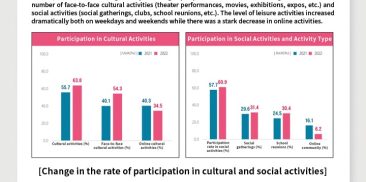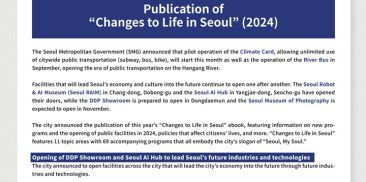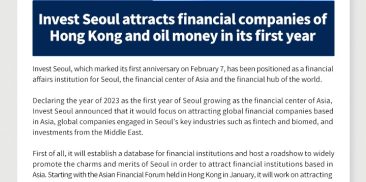特別号
-
2022 July (Vol.74)
-
特別号 登録日投稿者SMG ヒット517

Seoul initiates its Safety Income Pilot Program
The Seoul Metropolitan Government (SMG) is initiating a new guaranteed basic income program (“Safety Income Pilot Program”) to ensure a decent life for low-income households by providing financial support—more to those earning less. This program will provide financial assistance to 500 selected households over the course of five years starting July 2022. The city is conducting this program as a policy experiment to prepare for a welfare model of the future so that all members of society can be guaranteed a humane life at a time when income polarization and inequality issues are emerging as global issues with the advent of Industry 4.0. Scholars conducting income experiments abroad are also showing great anticipation for Seoul’s basic income policy experiment. Prof. Dr. Michael Kremer, a joint recipient of the 2019 Nobel Memorial Prize in Economic Sciences, remarked that “Seoul’s Safety Income Pilot Program is designed very differently than conventional studies, and I expect this program to bring about great opportunities.” Further anticipation was expressed by more scholars, including Prof. Dr. Jürgen Schupp, director of the German Institute for Economic Research, which in charge of conducting the basic income experiment in Berlin with his advisory team of 24 domestic peers; Prof. Dr. Daniel Selim Hamermesh, past president of the Society of Labor Economists in the US; Prof. Dr. Yasuyuki Sawada, professor of economics at the University of Tokyo in Japan; and Prof. Dr. Stacia Martin-West, co-director of the Center For Guaranteed Income Research at the University of Pennsylvania in the US. The city set up an advisory body comprising seven international scholars, including Prof. Dr. Jürgen Schupp and Prof. Dr. Stacia Martin-West, to conduct research on guaranteed basic income. Moreover, the city will promote its policy experiment through credible and objective research by hosting the Seoul International Forum on Income Security (tentatively named) this November to share and discuss the research results with domestic and international scholars. Seoul will also strive to establish an international cooperation system centered around the research advisory group of the Safety Income Pilot Program. In the short term, the city plans to hold regular academic meetings with the research advisory group members. In the long term, the city plans to establish and develop an international basic income research network comprising cities, researchers and institutes interested in basic income experiments. The goal is to create a multilateral network to share experiences through regular plenary meetings, research cooperation, and academic presentations so that participants can brainstorm on new ideas, give feedback, and mull over issues. As a new attempt to change the existing framework of welfare programs, Seoul plans to demonstrate the potential of its Safety Income Pilot Program in detail by analyzing its effect and comparing it with conventional welfare programs to create a future where all Seoul citizens can proudly dream and have hope without worries.
Like It
66 人がいいね!と言っています。








